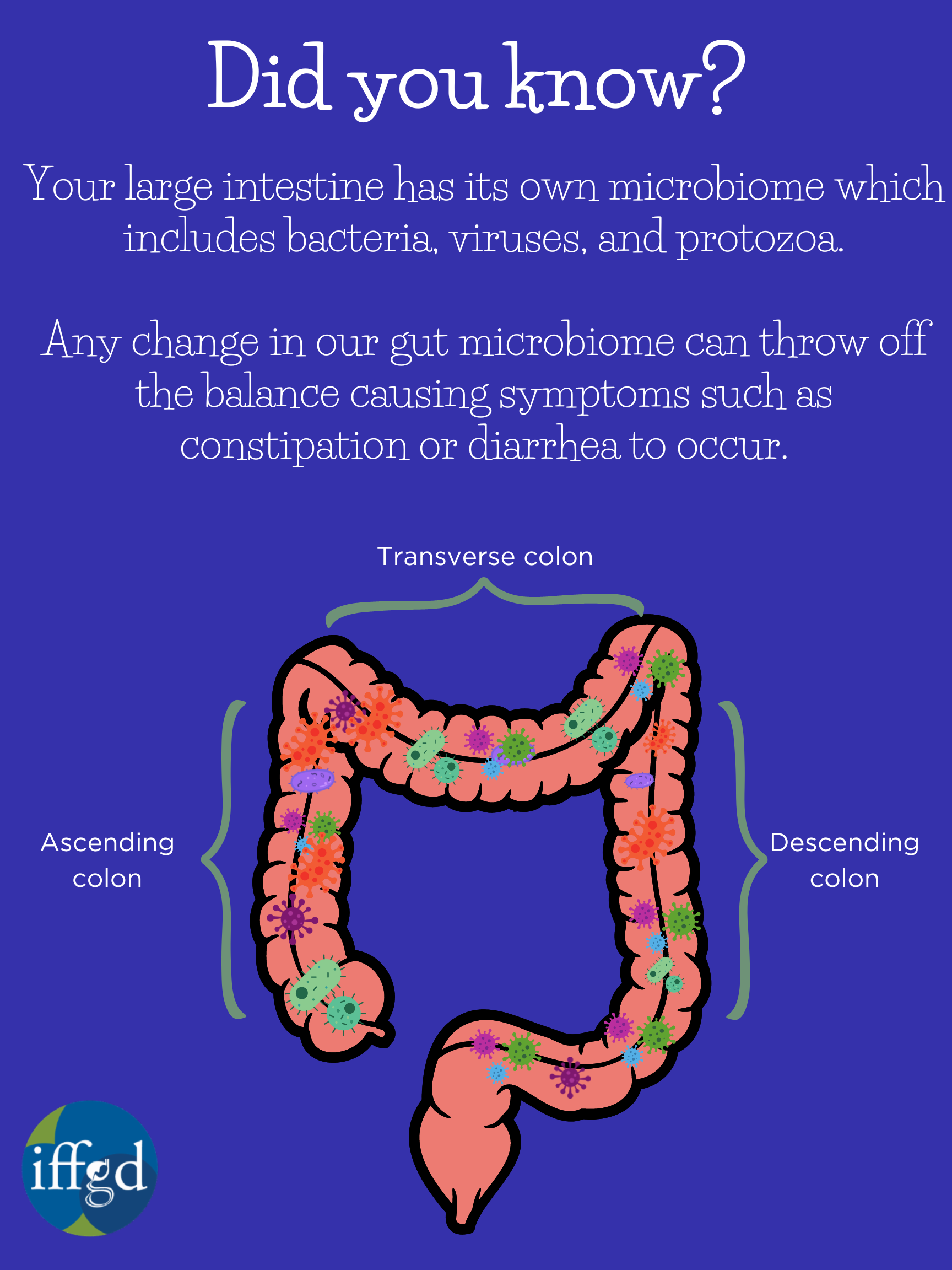What does our large intestine do?
The primary functions of the large intestine (colon) are to store food residues and to absorb water. Between what we drink and what is secreted into the stomach and intestine to help with food absorption, about 5 gallons of fluid is dumped into the large intestine every day.
Most of this fluid has to be reabsorbed to prevent us from becoming quickly dehydrated. This process takes time, and as a result, about 95% of the contractions of the colon are unsynchronized (nonperistaltic).
These contractions mix the contents of the large intestine back and forth but do not move them forward. As a consequence of this pattern of motility, food residues remain in the colon on average about 30 hours, and there are a lot of bacteria. The amount of bacteria varies depending on diet and use of antibiotics but can make up more than half of the weight of fecal material.
A second and very important type of motility that occurs in the large intestine is the high amplitude propagating contraction (HAPC). These contractions only occur 6-8 times per day in healthy people, but they are extremely strong contractions. They begin in the first part of the large intestine and sweep around all the way to just above the rectum.
These contractions move the contents of the large intestine ahead of them. They will often trigger a bowel movement, or at least the urge to have a bowel movement. Very slow contractions such as those seen in the upper part of the stomach (changes in muscle tone) also occur in the large intestine and may be important in its function, but they have not been studied enough to know for certain what they do.
Constipation
Constipation is usually described as infrequent bowel movements (less than 3 per week), passage of hard stools, and sometimes difficulty in passing stools. The sensations associated with constipation can include a constant feeling of needing to go, or a sensation of bloating or fullness. In children, constipation often leads to fecal incontinence.
Chronic constipation can be broadly divided into 3 classes based upon the underlying physiologic cause:
- Normal-transit constipation
- Slow-transit constipation
- Pelvic floor dysfunction
Diarrhea
The symptoms of diarrhea are frequent, loose or watery stools, and a subjective sense of urgency. People with diarrhea also may worry about loss of control over bowel movements. An excessive number of high amplitude propagating contractions can be a cause of diarrhea; it reduces the amount of time food residues remain in the large intestine for water to be reabsorbed. Changes in the motility of the small intestine may also occur, but there is little information available on this.
Hirschsprung’s disease
Hirschsprung’s disease is a rare congenital (a person is born with it) disorder that is caused by absence of nerve cells (ganglion) in the rectum and/or colon. Usually the problem involves only the bottom portion of the colon, but in some it involves the entire colon or even part of the small intestine. The part of the bowel that lacks nerve cells (aganglionic) cannot propel stool toward the anus, and therefore results in obstruction, severe constipation, or inflammation (enterocolitis). Although symptoms usually begin within a few days after birth, some people don’t develop them until childhood or even adulthood.
Learn More about Hirschsprung’s Disease
Irritable bowel syndrome (IBS)
The term “irritable bowel syndrome,” or IBS, is used to describe a group of symptoms that occur together. These symptoms include abdominal discomfort or pain and altered bowel habit – constipation and/or diarrhea. Bloating or distention of the abdomen is also common. IBS symptoms are believed to be caused partly by abnormal motility. In IBS, the motor function of the intestines overreacts to stimuli like meals or stress. This reaction can cause the intestines to become too active or not active enough.
In IBS, the normal functioning of the bowels are affected and don’t work properly. Sometimes they move too much or too often, and sometimes they don’t move enough or often enough, and usually the nerves in the bowels are more sensitive to stretch or movement and this can lead to more pain. Importantly there are no visible abnormalities seen by x-ray or endoscopy.
Adapted from IFFGD Publication: Gastrointestinal Motility Disorders of the Small Intestine, Large Intestine, Rectum, and Pelvic Floor by William E. Whitehead, PhD, Co-Director, Center for Functional GI & Motility Disorders Center; Professor of Medicine, Division of Digestive Diseases; Professor of Psychology, University of North Carolina, Chapel Hill, NC, IFFGD Publication #839 by Samuel Nurko, MD, MPH, Center for Motility and Functional Gastrointestinal Disorders, Children’s Hospital Boston, Boston, MA, “Irritable Bowel Syndrome” by Douglas A. Drossman, MD, Drossman Gastroenterology PLLC, Chapel Hill, NC from the Functional GI Disorder Education Guide, IFFGD; 2005, and “Characteristics of Chronic Constipation” IFFGD; 2006. (Accessed April 15, 2006) Link.












